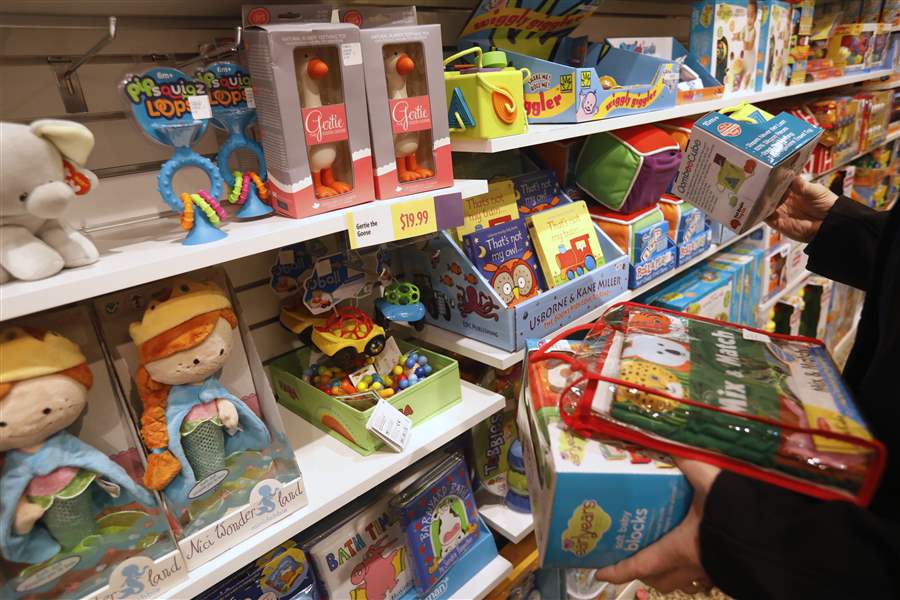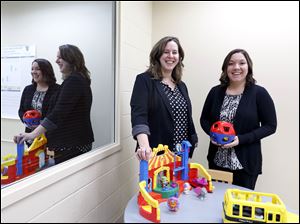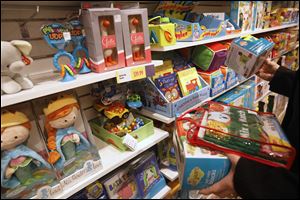
UT study: Fewer toys can lead to better play for toddlers
12/12/2017
Sarah Smith checks out customers inside Learning Express Toys at the Shops at Fallen Timbers in Maumee.
The Blade/Katie Rausch
Buy This Image

Alexia Metz, associate professor at the Unversity of Toledo, with occupational therapist and former UT graduate student Carly Dauch at UT Health and Human Services building.
It’s the Christmas season, that magical time when parents, grandparents, and aunts and uncles blow through their bank accounts to fill up any open space under trees with as many toys as possible.
But a new study released by the University of Toledo came to a conclusion many parents won’t find too surprising — fewer toys presented at once can help toddlers “focus better and play more creatively.”
“As an occupational therapist and parent, I had noticed when environments were busy, kids flitted around a lot more,” said Alexia Metz, an associate professor of occupational therapy at the University of Toledo. “It was hard to keep them focused on what was at hand if there was something in their periphery that was tempting them to break away.”
Read an excerpt from the study
VIDEO: UT study on toys, toddlers
Tina Nowakowski of Swanton was shopping for her 11-year-old son at Learning Express at Fallen Timbers Mall on Thursday, and while her son is past that stage of development, her experience in daycare work at Little Village in Maumee was in line with the research findings.
“They become more creative with their toys, they start to develop their imaginations earlier,” Ms. Nowakowksi said. “If they only have so many toys, they’re going to use them in new ways and explore different ways to play with them.”
UT researchers brought in 36 toddlers between the ages of 1½ and 2½ to play in a room for 30 minutes. They were divided into two groups, with either four toys or 16 toys.
Carly Dauch, the study’s lead author, said the toddlers were recruited from local childcare centers, healthcare centers, schools, and word of mouth.
Ms. Metz said most came from families best described as middle class or wealthier. She said she’d look for a more diverse group if given the chance to repeat the study, which is titled: “The influence of the number of toys in the environment on toddlers’ play” and will be published in February in the journal Infant Behavior and Development.
One repeated quote from parents in particular got Ms. Metz interested in conducting the research: “They have all these toys, but they don’t play with any of them,” Ms. Metz said.
While the knee-jerk reaction to the study might be to scale back and buy less toys, Ms. Metz said the findings actually point elsewhere.
“I certainly don’t want to rain on anyone’s gift-giving habits because there’s fun in that. There’s fun in that morning where you’re opening up presents or the birthdays, there’s joy in giving,” she said. “On those special days, it’s up to the families. They know their kids best.”
Instead, she hopes the research makes parents think about the days following Christmas or birthdays when toddlers find themselves nearly overwhelmed in an avalanche of new toys. The research wasn’t intended to affect the purchasing patterns of consumers.

Sarah Smith checks out customers inside Learning Express Toys at the Shops at Fallen Timbers in Maumee.
Lindsey Miller, the assistant manager at Learning Express in Maumee, said — as an only child herself — she has personal experience to prove the results correct.
“It’s quality versus quantity,” she said. “Too much of anything can be bad for you.
“I was an only child. I had a lot of toys, I was spoiled rotten, and I think I turned out OK. ... I grew up to be a minimalist because if you’re lucky enough to grow up with that, I think it makes you appreciate it.”
First-time parents Zac and Julie Stein of Perrysburg were shopping for their 10-month-old son’s first Christmas. Mr. Stein said he has noticed his son will focus mainly on one toy and ignore the others. But neither that nor the study will affect how he and his wife plan on proceeding with their Christmas buying plans.
“This is his first Christmas, so he’s probably going to get spoiled rotten,” Mr. Stein said. “I agree he probably doesn’t need a ton, but as first-time parents around Christmas, it’s hard not to spoil him.”
Kathy Bolling of Holland was shopping for her grandsons and had no intention of adjusting her focus.
“I don’t know if it really affects me because I like spoiling my grandsons, and you only bring out one toy at a time, especially for the toddler,” Ms. Bolling said. “... I believe it and it’s not surprising, but I’m still going to buy all the toys.”
Contact Jeremy Schneider at jschneider@theblade.com, 419-724-6082, or via Twitter @thewerewolfawoo.